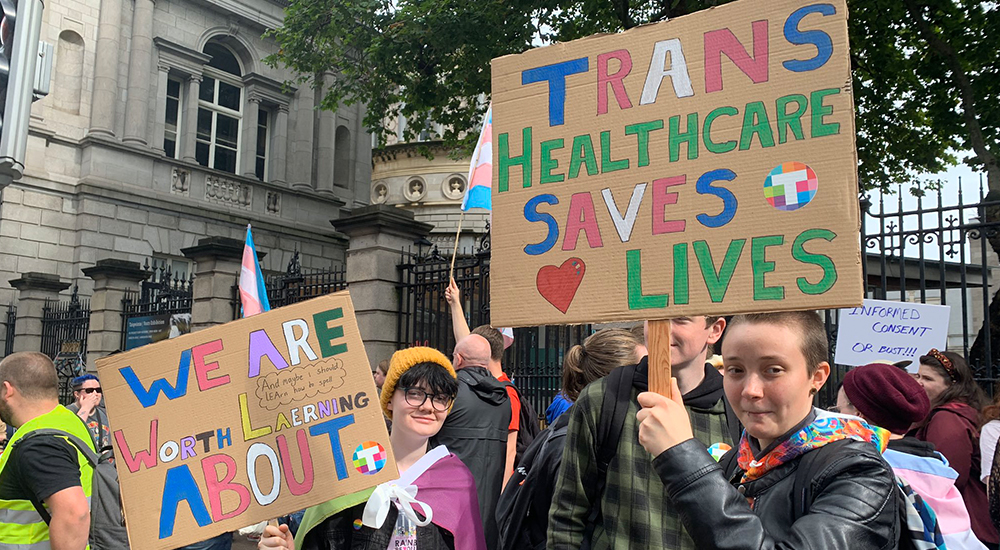By Ollie Bell
Despite Ireland winning many gains for the LGBTQ+ community such as Marriage Equality and the Gender Recognition Act in 2015, the fight for LGBTQ+ rights isn’t over. Currently the trans community is facing the ever-growing crisis of the trans healthcare system in Ireland.
No services for young people
For transgender youth, sometimes puberty blockers are given at the start of puberty to temporarily suppress puberty, though this is very uncommon. They are used to just give a young person some time to solidify their gender and decrease any gender dysphoria they may have. Not a lot of trans youth are given the option to go on puberty blockers so most trans youth have to wait until they’re 18 to get HRT. This is due to medical transphobia which believes trans youth are confused or going through a phase, lack of family support and the misinformation spread by transphobes and trans-exclusionary radical feminists about the ‘dangers’ of puberty blockers. This is despite the fact that puberty blockers are given to cisgender children who start puberty abnormally early, yet the same fear mongering is absent.
The Gender Identity adolescent clinic in Crumlin Hospital is no longer running as of January 2021. Young trans people are still being referred to this clinic despite it no longer operating. From the age of 17 onwards they can be referred to the adult clinic in Loughlinstown. The waiting list for Loughlinstown is 6-10 years.
There are currently two endocrinologists in Ireland that can prescribe HRT to trans people. They both require trans people to undergo a psychiatric evaluation and get a diagnosis of gender dysphoria. The Loughlinstown clinic operates under a psychotic model of care despite the WHO declassfying being transgender as a mental disorder in 2019, and this model of care going against international best practices as put forth by World Professional Association for Transgender Health (WPATH).
Outdated, damaging models
Once a trans person gets their first appointment in Loughlinstown, they go through a three-hour long process with an eight-minute break. They’re asked invasive, personal questions about their family, childhood, relationships and any trauma they may have gone through. These questions are often highly sexualised. Trans people are asked about their porn habits, sexual history, their thoughts during oral sex and if wearing certain clothes turns them on. These questions are based on the outdated and debunked idea that trans people, especially trans women, are fetishists who are turned on by presenting as their preferred gender.
There’s no recognition of non-binary trans people, forcing many to pretend they’re trans men or trans women in order to access HRT. Patients have been denied access to HRT for multiple reasons such as having a diagnosis of autism, ADHD or a personality disorder, if they refuse to answer any of the questions or if they don’t bring a family member with them.
The dehumanising treatment and long waiting lists force many trans people to find other alternatives to seeking HRT. For those who can afford it, private services like GenderGP are available, but quite expensive. Other trans people buy hormones online and admistrate it themselves under no medical supervision. There are no public options for gender-affirming surgeries, forcing many trans people to set up fundraisers to cover the costs of surgery and travelling abroad.
A proper public health service
How did it get this bad? Well, the state of trans healthcare in Ireland can’t be detached from the crumbling HSE that’s had its funding stripped away over many years. Long waiting lists are just characteristic of the Irish healthcare system. Along with this is the fear from medical professionals of trans people regretting transitioning and detransiting if an informed consent model is put in place. Detransition rates are low, and in any case often not because a person realises they’re not trans. Lack of family support, threats of violence and medical issues are some of the biggest reasons.
It’s clear that the National Gender Service won’t be fixed by more funding or staff. Rather the NGS and the model of care it uses should be abolished in favour of a GP-led, consent-based model which empowers trans people to take agency over their bodies and provides them with all the care and treatments they need as part of a free, quality public health system.












